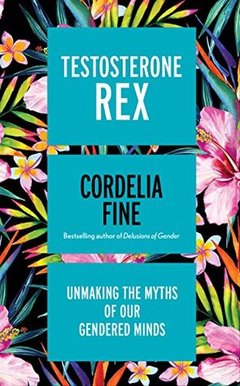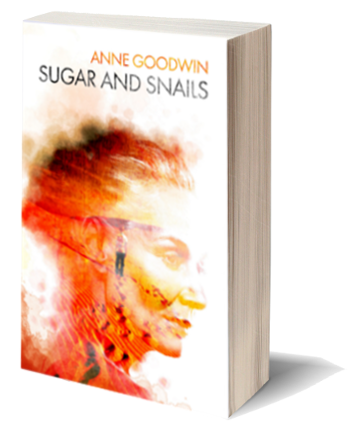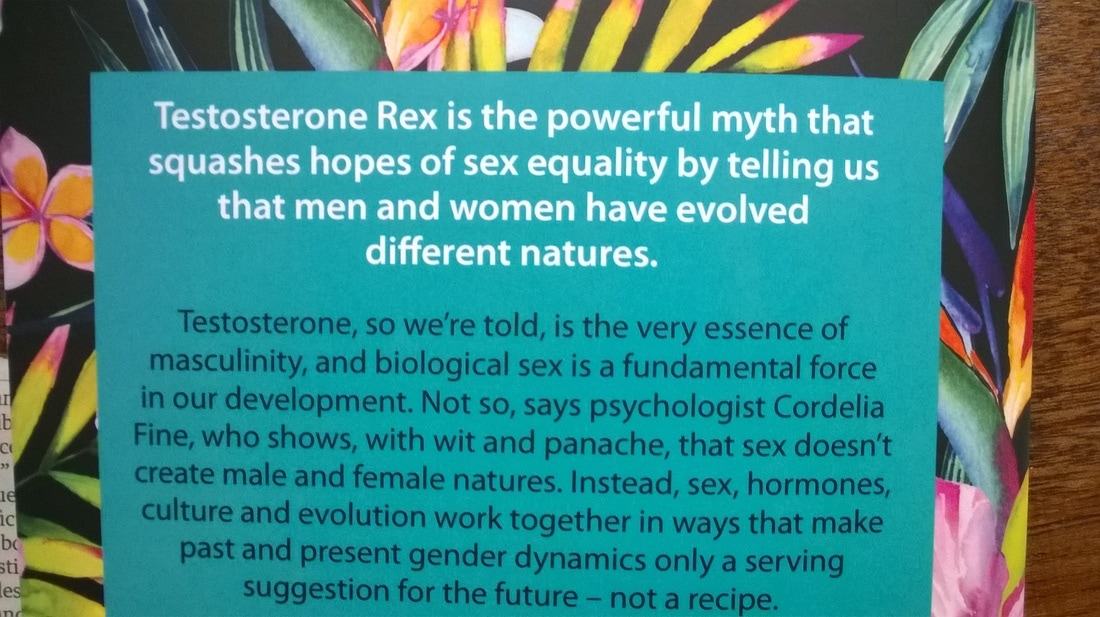| Having written a novel about the enigma of gender, I remain fascinated and baffled that something so vague and ill-defined should impact so strongly on our social structures and beliefs about ourselves. Fortunately, Cordelia Fine, psychologist and Associate Professor at the Melbourne Business School, is somewhat sharper in demolishing the dodgy science surrounding sex and gender and International Women’s Day seems the perfect time to review her new (non-fiction) book. |
| “In fact, it’s perfectly simple.” Venus stroked the sleeve of Mohammed’s fine-knit turquoise cardigan. “We women are genetically programmed to obsess over our appearance” … “Maybe it’s largely how we think,” Venus continued. “The way, when a woman gets home from work, it never enters her head her to crack open a beer and lounge on the sofa like a man does. The way she instinctively rolls up her sleeves and starts cooking supper while helping the kids with their homework and ironing her husband’s shirt for the next day.” |
The chapter on brain and behavioural differences, Why Can’t a Woman Be More like a Man, could be summarised in two words: she can. A large-scale brain imaging study designed to maximise the opportunities for finding sex differences in the sample found that under 8% of people had only female or only male brain features. Most comprised unique mosaics of features suggesting (p92):
a neuroscientist certainly might be able to correctly guess your sex from your brain, but she wouldn’t be able to guess the structure of your brain from your sex.
A similar mosaic has been found for psychological measures, with less than 1% of respondents having solely “masculine” or “feminine” characteristics. Additionally, a synthesis of forty-six meta-analyses of sex difference studies found small effect sizes (p101):
meaning that about forty percent of the time, at least, if you chose a woman and a man at random, the woman’s score would be more “masculine” than the man’s, or vice versa.
If that’s not enough to conquer Testosterone Rex, she cites fascinating research on birdsong showing that, while in most species the males’ superiors singing is attributable to the larger and denser “song-control” region in the brain, in a species where males and females sing in unison females compensate for “their smaller neural real estate” by producing brain-altering proteins at a much higher rate. There’s no logical reason why, in humans too, neurobiological sex differences, rather than functioning to create differences in behaviour, might serve to iron them out.
In the following chapter the notion of inherent male competitiveness and risk-taking is similarly deconstructed, showing it’s not a stable or unified personality trait and that gendered assumptions of what risk-taking is (for example, overlooking the enormous risk taken by women in pregnancy) dominate assessment and research procedures. Furthermore, since preferences depend on a cost-benefit analysis for the individual, this research overlooks the genuine real-world differences in consequences for certain behaviours among men versus women. A study addressing ethnicity as well as sex differences found, unsurprisingly, that the world seemed a significantly safer place for powerful white males than for any other groups.
That’s a lot of science before we even get to hormones. With males in general having more testosterone circulating in their bloodstreams than women, surely Cordelia Fine can’t argue that’s a social construction? Well, to a degree, she can. Firstly, there’s a complex biological system mediating between testosterone and brain activity, including the existence of a biological catalyst that can convert testosterone to oestrogen, so that the variable that’s easiest to measure – absolute testosterone levels in the blood or saliva – becomes at best a guestimate of testosterone’s effect on the brain. Secondly, in humans as in other creatures (most colourfully in a species of cichlid fish), social circumstances have been shown to impact on testosterone levels, rather than the other way round. For example, fatherhood reduces testosterone levels in men, especially men physically caring for their children, and both women and men on the lookout for a new partner have higher testosterone than the “happily coupled”.
With the financial crisis repeatedly credited to the “testosterone-fuelled” atmosphere of the stock exchange, Cordelia Fine also analyses the scientific literature relating specifically to financial risk-taking. Here, once again, she finds no strong evidence of a fundamental difference between men and women, with social context seemingly impacting more strongly than hormones on financial decision-making.
In the final chapter Cordelia Fine reviews the aggressive marketing of gendered toys for children, and the equally aggressive backlash against those who seek to change this. Although young children under three years of age showed no particular preference for toys traditionally associated with their own sex, they do when they reach the age at which they become conscious of social norms, including their own gender, and choose to conform. Perhaps beyond the scope of this book, but it’s surely not insignificant that separate toys for boys and girls means that shops and manufacturers can sell more of them.
| In summary, gender roles are too diverse across time and cultures to be determined in advance by genes or hormones. The book concludes with a call to action: “maybe it’s time [for feminists] to be less polite and more destructive” as change is “a question for values, not science” (p195). Thanks to Icon books for my proof copy. What will you do to slay the phantom of Testosterone Rex? Meanwhile, for a fictional slant on international women, check out my previous post on bloody revolutions. |

























 RSS Feed
RSS Feed





















